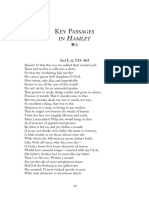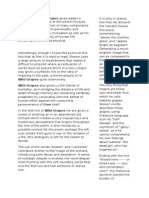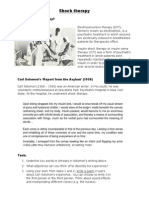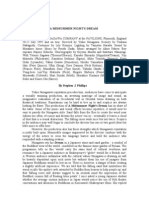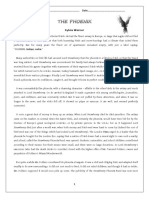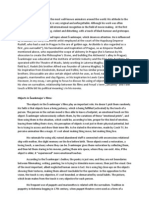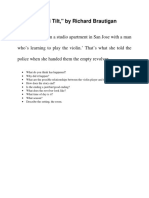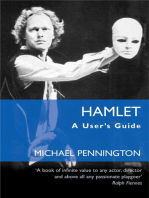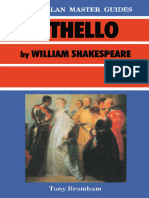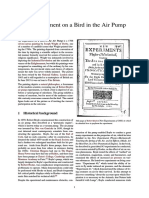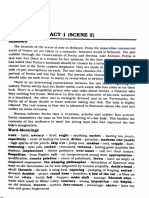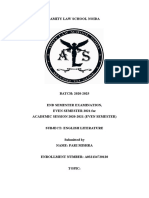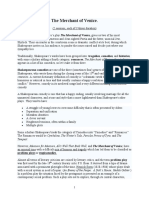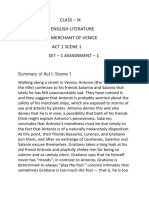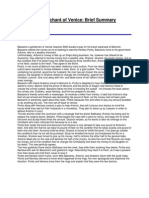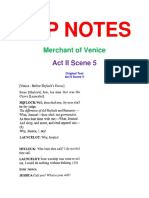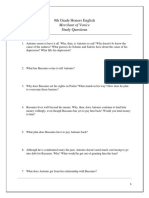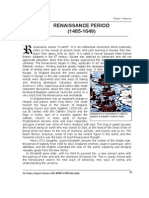Harold Bloom On The Merchant of Venice
Harold Bloom On The Merchant of Venice
Uploaded by
Sayak GhoshCopyright:
Available Formats
Harold Bloom On The Merchant of Venice
Harold Bloom On The Merchant of Venice
Uploaded by
Sayak GhoshOriginal Description:
Original Title
Copyright
Available Formats
Share this document
Did you find this document useful?
Is this content inappropriate?
Copyright:
Available Formats
Harold Bloom On The Merchant of Venice
Harold Bloom On The Merchant of Venice
Uploaded by
Sayak GhoshCopyright:
Available Formats
Blooms Shakespeare Through the Ages THE MERCHANT OF VENICE Edited and with an introduction by Harold Bloom Sterling
Professor of the Humanities Yale University Volume Editor Neil Heims Contents Series Introduction. ix Introduction by Harold Bloom. xi Biography of William Shakespeare. 1 Summary of The Merchant of Venice. 5 Key Passages in The Merchant of Venice. 15 List of Characters in The Merchant of Venice. 35 Criticism Through the Ages The Merchant of Venice in the Seventeenth Century. 39 1664Thomas Jordan. On the stage appearance of Shylock. 41 The Merchant of Venice in the Eighteenth Century. 43 1701George Granville, Baron Lansdowne, from The Jew of Venice. 44 709Nicholas Rowe. Life of the Author, from The Works of Mr. William Shakespear. 46 1710Charles Gildon, from Remarks on the Plays of Shakespear. 47 1765Samuel Johnson. The Merchant of Venice (notes), from The Plays of William Shakespear. 48 1775Georg Christoph Lichtenberg, from Letters from England. 49 The Merchant of Venice in the Nineteenth Century. 51 1809August Wilhelm Schlegel. Criticisms on Shakspeares Comedies, from Lectures on Dramatic Art and Literature. 54 1817William Hazlitt. The Merchant of Venice, from Characters of Shakespears Plays . 56 1833Anna Jameson. Portia, from Characteristics of Women: Moral, Poetical, & Historical . . . . . . . . . . . . . . . . . . . . . . . . . . . . . . . . . . . . .60 1838Heinrich Heine, from Heine on Shakespeare: A Translation of His Notes on Shakespeare Heroines. . . . . . . . . . . . . . . . . . . . . . . .66 1839Hermann Ulrici. The Merchant of Venice, from Shakspeares Dramatic Art. 70 1849Georg Gottfried Gervinus. The Merchant of Venice, from Second Period of Shakespeares Dramatic Poetry. 75 1849Charles Knight, from Studies of Shakespeare. 84 1862Friedrich Alexander Theodor Kreyssig, from Vorlesungen uber Shakespeare . 90 1863Charles Cowden Clarke. The Merchant of Venice, from Shakespeare-Characters: Chiefly Those Subordinate. 91 1864Victor Hugo, from William Shakespeare . 95 1872H. N. Hudson. The Merchant of Venice, from Shakespeare: His Life, Art, and Characters. 96 1879Review of The Merchant of Venice, from The Saturday Review. 99
1881A. Pietscher, from Jurist und Dichter . 102 1886Rudolf von Ihering, from Der Kampf ums Recht. 104 1894G. H. Radford. Shylock, from Shylock and Others: Eight Studies. 106 1898Georg Brandes, from William Shakespeare: A Critical Study. 111 The Merchant of Venice in the Twentieth Century. 119 1913Sigmund Freud. The Theme of the Three Caskets, from On Creativity and the Unconscious. 123 1927Elmer Edgar Stoll. Shylock, from Shakespeare Studies: Historical and Comparative in Method. 132 vi Contents 1930Harley Granville-Barker. The Merchant of Venice, from Prefaces to Shakespeare, Second Series. 149 1936J. Middleton Murry. Shakespeares Method: The Merchant of Venice, from Shakespeare. 150 1959C. L. Barber. The Merchants and the Jew of Venice: Wealths Communion and an Intruder, from Shakespeares Festive Comedy. . . . . . . . . . . . . . . . . . . . . . . . . 164 1962W. H. Auden. Love and Usury in The Merchant of Venice, from The Dyers Hand and Other Essays. 174 1965Northrop Frye. From A Natural Perspective: The Development of Shakespearean Comedy and Romance. . . . . . . . . . . . . . . 183 1972Leslie A. Fiedler. The Jew As Stranger; or These Be the Christian Husbands, from The Stranger in Shakespeare. 185 1987A. D. Nuttall. The Merchant of Venice, from A New Mimesis: Shakespeare and the Representation of Reality. 188 1991Harold Bloom. Introduction, from Shylock . 198 1992John Gross. Three Thousand Ducats, from Shylock: Four Hundred Years in the Life of a Legend . 205 1996James Shapiro. The Pound of Flesh, from Shakespeare and the Jews. 206 t The Merchant of Venice in the Twenty-first Century. 225 2002Gary Rosenshield. Deconstructing the Christian Merchant: Antonio and The Merchant of Venice, from Shofar: An Interdisciplinary Journal of Jewish Studies. 225 Bibliography. 251 Acknowledgments . 253 Index. 255
Introduction to The Merchant of Venice (pp. 1-1 59) is resolutely committed to the phraseology of 1 980s cultural materialism: the word recuperate and its cognates (not in the sense of getting well but of recovering something lost) is used five times, ideology and its cognates nineteen SHAKESPEARE 329 times. Each section of the introduction is a short essay on a theme, and many of them can be rather too easily summed up in a sentence that Drakakis draws out into several pages. Thus 'Venice: Myth and Reality' (pp. 3-8) tells us how Elizabethans perceived this exotic place, 'The Menace of Money' (pp. 8-12) gives a general introduction to the play's ideas about what money is and what it can do, and 'Usury or the Butler's Box (pp. 1 2-17) offers more on what early moderns thought of usury, although with
no explanation of the term Butler's Box, which comes up in an early book that Drakakis quotes. More substantial is the section 'Marlowe, Shakespeare and the Jews' (pp. 1 7-30) on the religious and economic contexts. Drakakis refers to Shylock as 'the Jew', Lancelot Gobbo as 'Clown' and Old Gobbo as 'Giobbe' without referring the reader forward to a place where these choices are explained. Drakakis's argument is much concerned with 'otherness', the idea that what Jewishness represented was the troubled incapacity of Christianity to do all that it would-especially in relation to economic development-for which the Jews as scapegoats had to be punished. No explanation is offered for a reference to 'the allegedly sexually inadequate Lancelet' (p. 26), nor why he here becomes 'Lancelet' instead of Clown or Lancelot.
You might also like
- Merchant of Venice Masterprose Study Question ResponsesDocument11 pagesMerchant of Venice Masterprose Study Question ResponsesArchanna VyassNo ratings yet
- The Thanksgiving Play NotesDocument6 pagesThe Thanksgiving Play Notesolivia celestinNo ratings yet
- A Study Guide for e. e. cummings's "Maggie and Milly and Molly and May"From EverandA Study Guide for e. e. cummings's "Maggie and Milly and Molly and May"No ratings yet
- Updated THE METAMORPHOSIS 0 THE HUNGER ARTIST COMPARE AND CONTRAST PDFDocument4 pagesUpdated THE METAMORPHOSIS 0 THE HUNGER ARTIST COMPARE AND CONTRAST PDFTodun LiNo ratings yet
- Bloom - Key Passages in HamletDocument16 pagesBloom - Key Passages in HamletJooby77No ratings yet
- Wild Grapes AnalysisDocument2 pagesWild Grapes AnalysisCourtney Diggins100% (5)
- Carl Solomon's Report From The AsylumDocument1 pageCarl Solomon's Report From The AsylumMarcusFelsmanNo ratings yet
- An Inspector Calls - ContextDocument3 pagesAn Inspector Calls - ContextMaria100% (1)
- Snowwhite PDFDocument10 pagesSnowwhite PDFTop ten PediaNo ratings yet
- The Cambridge Companion To Walt - Ezra Greenspan PDFDocument18 pagesThe Cambridge Companion To Walt - Ezra Greenspan PDFAzraeel07No ratings yet
- Comments by Fintan O'TooleDocument4 pagesComments by Fintan O'TooleMiss_M90No ratings yet
- Merchant of Venice - Activity Toolkit - 2020 - v2Document28 pagesMerchant of Venice - Activity Toolkit - 2020 - v2anupamaNo ratings yet
- TG What's Eating Gilbert Grape 10 PagesDocument11 pagesTG What's Eating Gilbert Grape 10 PagesKweka NyawNo ratings yet
- Looking For Richard Script Commentary 1Document28 pagesLooking For Richard Script Commentary 1Vaibhav KhannaNo ratings yet
- My Last Duchess Revision NotesDocument11 pagesMy Last Duchess Revision NotesziggerastikkaNo ratings yet
- A Doll's House - A Critical IntroductionDocument20 pagesA Doll's House - A Critical IntroductionAadivya RaushanNo ratings yet
- Shakespeare in LoveDocument9 pagesShakespeare in LoveMr. Indranil Sarkar M.ANo ratings yet
- Director's Notes For Hamlet's First SoliloquyDocument5 pagesDirector's Notes For Hamlet's First SoliloquyDee Yana0% (1)
- PicturesqueDocument22 pagesPicturesqueFaisal Nanda UtamaNo ratings yet
- Antigone Background Pack-2Document18 pagesAntigone Background Pack-2Bethany KellyNo ratings yet
- NinagawaDocument2 pagesNinagawaKeloe Eh TongNo ratings yet
- Essay and Multimodal Task DesignDocument3 pagesEssay and Multimodal Task Designapi-410625203100% (1)
- NUMÉRO DEUX - Jonathan RosenbaumDocument5 pagesNUMÉRO DEUX - Jonathan Rosenbaumyahooyahooyahoo1126No ratings yet
- The Phoenix PDFDocument3 pagesThe Phoenix PDFAnaliadomiNo ratings yet
- Cat On A Hot Tin Roof EssayDocument3 pagesCat On A Hot Tin Roof EssayDragan Hardi100% (1)
- Edward ScissorhandsDocument3 pagesEdward ScissorhandsOdetteNo ratings yet
- Analysis of Titus AndronicusDocument2 pagesAnalysis of Titus AndronicusAmy AlayoNo ratings yet
- Watership DownDocument265 pagesWatership Downmarwagh99No ratings yet
- Objects in Švankmajer S FilmsDocument5 pagesObjects in Švankmajer S FilmsBára Anna StejskalováNo ratings yet
- The Tempest PDFDocument142 pagesThe Tempest PDFCimocohNo ratings yet
- Shakespeare and Modern Version of His PlaysDocument22 pagesShakespeare and Modern Version of His PlaysMaja MileticNo ratings yet
- The Winters Tale (William Shakespeare) (Z-Library) - 240124 - 131550Document500 pagesThe Winters Tale (William Shakespeare) (Z-Library) - 240124 - 131550Spriha Roy ChowdhuryNo ratings yet
- 03 Writing Lesson Plans Using Blooms TaxonomyDocument2 pages03 Writing Lesson Plans Using Blooms TaxonomyReem Amin Ul HaqNo ratings yet
- The Farmer's Bride - Charlotte MewDocument8 pagesThe Farmer's Bride - Charlotte MewemilybyrnebuchsNo ratings yet
- The Plato Papers: by Peter AckroydDocument14 pagesThe Plato Papers: by Peter AckroydAslı TaşkınerNo ratings yet
- Thehappyprince 191101052528Document22 pagesThehappyprince 191101052528Ahmed Ghazi100% (1)
- Arcadia: What's InsideDocument25 pagesArcadia: What's InsideManshi YadavNo ratings yet
- John Proctor Crucible EssayDocument7 pagesJohn Proctor Crucible EssayallthingswaltNo ratings yet
- Sherlock Holmes - Books and Movie ComparisonDocument10 pagesSherlock Holmes - Books and Movie ComparisonAisya IsmailNo ratings yet
- Plays and Playing in 'Twelfth Night'Document10 pagesPlays and Playing in 'Twelfth Night'cecilia-mcd100% (1)
- The Telephone CallDocument20 pagesThe Telephone CallBobaAnimeNo ratings yet
- The Shakespearean Heroes As The Antecessors of The Heroes of The Theatre of The AbsurdDocument18 pagesThe Shakespearean Heroes As The Antecessors of The Heroes of The Theatre of The AbsurdVirginia VallinaNo ratings yet
- Impossible Plays - Adventures With The Cottesloe CompanyDocument255 pagesImpossible Plays - Adventures With The Cottesloe CompanyAditya TripathiNo ratings yet
- Extremes of Gender and PowerDocument12 pagesExtremes of Gender and PowerMarianela SanchezNo ratings yet
- Some Critics Quotes A Streetcar Named DesireDocument2 pagesSome Critics Quotes A Streetcar Named Desireac5sro2018No ratings yet
- William Shakespeare - A Biography (PDFDrive)Document518 pagesWilliam Shakespeare - A Biography (PDFDrive)Ara Suzane Carreon Pahayahay100% (1)
- Gothic Lesson One Yr 7Document5 pagesGothic Lesson One Yr 7lijasper2No ratings yet
- Patterns of Imagery in MacbethDocument10 pagesPatterns of Imagery in MacbethKamoKamoNo ratings yet
- 142 VertigoDocument6 pages142 Vertigobas.beydoun10No ratings yet
- (Macmillan Master Guides) Tony Bromham (Auth.) - Othello by William Shakespeare-Macmillan Education UK (1988)Document105 pages(Macmillan Master Guides) Tony Bromham (Auth.) - Othello by William Shakespeare-Macmillan Education UK (1988)Timir Baran GayenNo ratings yet
- The Comedy of ErrorsDocument43 pagesThe Comedy of ErrorsSDNo ratings yet
- Devils Wife Oral ScriptDocument7 pagesDevils Wife Oral ScriptAaliya HusseinNo ratings yet
- Stella KowalskiDocument13 pagesStella KowalskiKaterina AntonNo ratings yet
- Kitchen - Assignment QuestionsDocument2 pagesKitchen - Assignment QuestionsGrace QiuNo ratings yet
- Edward Scissorhands and Hyper RealismDocument19 pagesEdward Scissorhands and Hyper RealismOdetteNo ratings yet
- An Experiment On A Bird in The Air PumpDocument10 pagesAn Experiment On A Bird in The Air PumpFlorinAnghelNo ratings yet
- MOV-Act 5 WKBKDocument3 pagesMOV-Act 5 WKBKtanmy33No ratings yet
- Act 2 Scene 2 Merchant of VeniceDocument6 pagesAct 2 Scene 2 Merchant of VeniceAll in oneNo ratings yet
- Adobe Scan Sep 25, 2022Document6 pagesAdobe Scan Sep 25, 2022shahaludeen ummarNo ratings yet
- AMITY LAW SCHOOL NOIDA Englishhhhh ModulesssssDocument15 pagesAMITY LAW SCHOOL NOIDA Englishhhhh ModulesssssPari MishraNo ratings yet
- Merchant of Venice: Act Iii Scene IiDocument48 pagesMerchant of Venice: Act Iii Scene Iinaitik jainNo ratings yet
- Merchant of Venice Lecture Transcript HighlightedDocument21 pagesMerchant of Venice Lecture Transcript Highlightedprogamer100% (1)
- STD Ix English Literature Merchant of Venice Act 1 SC 1 Set 1 AssignmentDocument7 pagesSTD Ix English Literature Merchant of Venice Act 1 SC 1 Set 1 AssignmentWindows AjsNo ratings yet
- The Merchant of Venice Revision NotesDocument14 pagesThe Merchant of Venice Revision NotesRahul Chauhan50% (2)
- CSEC Study Guide - December 7, 2010Document10 pagesCSEC Study Guide - December 7, 2010Anonymous Azxx3Kp9No ratings yet
- The Merchant of VeniceDocument6 pagesThe Merchant of VeniceLeshalka SoodNo ratings yet
- Enghl P2 Memo GR11 Nov 2017Document22 pagesEnghl P2 Memo GR11 Nov 2017tanatswachifamba20No ratings yet
- SummariesDocument6 pagesSummariesAashika LakhaniNo ratings yet
- ICSE Eng 2 Specimen Paper PDFDocument14 pagesICSE Eng 2 Specimen Paper PDFSanjeevan Aravindan (JEEV)No ratings yet
- Class-VI ENglish Notes-23 Pandora and The Mystery BoxDocument2 pagesClass-VI ENglish Notes-23 Pandora and The Mystery Boxdivyaansh.aroraNo ratings yet
- The Quality of Mercy Is Not Strain'd: OriginDocument2 pagesThe Quality of Mercy Is Not Strain'd: OriginBarok EspinozaNo ratings yet
- Legal Aspects in Merchant of VeniceDocument1 pageLegal Aspects in Merchant of VenicekashyapNo ratings yet
- Abp Notes: Merchant of VeniceDocument12 pagesAbp Notes: Merchant of VeniceTHE CONQUERORNo ratings yet
- Review On The Merchant of Venice (2004)Document2 pagesReview On The Merchant of Venice (2004)Ilhamdi HafizNo ratings yet
- Postcolonial Elements in The Merchant of VeniceDocument2 pagesPostcolonial Elements in The Merchant of VeniceDhanush NNo ratings yet
- Drama - The Merchant of Venice: Character AnalysisDocument8 pagesDrama - The Merchant of Venice: Character AnalysisSwasti's StudioNo ratings yet
- MofV SQDocument23 pagesMofV SQSoham MultaniNo ratings yet
- The Merchant of Venice SUMMARYDocument26 pagesThe Merchant of Venice SUMMARYDeh TavernitiNo ratings yet
- RenaissanceDocument14 pagesRenaissanceParlindungan Pardede100% (1)
- Part-I: Q. Answer The Following QuestionsDocument8 pagesPart-I: Q. Answer The Following Questionskunal mehtoNo ratings yet
- PlotDocument2 pagesPlotArwaAl-aniziNo ratings yet
- Act 1 Scene 1Document4 pagesAct 1 Scene 1AppleRanNo ratings yet
- Shakespeare and Italy - Mario PrazDocument16 pagesShakespeare and Italy - Mario PrazSara AntoniazziNo ratings yet
- The Two StandardsDocument3 pagesThe Two StandardsMarisa Areola ClimacoNo ratings yet





